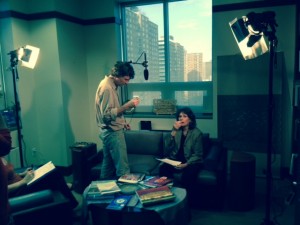I attended a holiday party at my day job not that long ago and one of the people attending was someone we interviewed. I say we, but I actually didn’t do the interviewing, my colleague did. I operated the camera.
 At this party I found myself beside the interviewee and we began chatting. It was clear she didn’t remember me as the person who hooked a lav on her, beamed hot lights on her.
At this party I found myself beside the interviewee and we began chatting. It was clear she didn’t remember me as the person who hooked a lav on her, beamed hot lights on her.
I wasn’t offended by this at all. In fact, I took pride in not being remembered. And here’s why —
I make no secret of the fact that I once had the privilege of shooting an interview with David Hockney for Roland Tec’s documentary, Thunder Every Day. Hockney was an important artist in my development; he was the first modern artist I really got and that opened a big intellectual, emotional, and artistic door. Yep, one door, those three things.
I was nervous as I set up, everyone in the room was nervous. Hockney entered the room and was spectacularly charming. He talked and smoked non-stop, was outrageous and cracked joke after joke. Early on in the interview after one of his quips I looked up from the monitor, smiled, and tried to suppress a laugh, and of course being the hyper observant artist he is, Hockney noticed that and he started playing to me in addition to Roland, who was doing the interviewing. And that’s not good. His eyes needed to be on the interviewer, not drifting over to me from time to time to see me cracking up. Me being the somewhat observant filmmaker that I am, noticed that and kept my head down and stared at the monitor for the rest of the interview. Hockney couldn’t see my face any longer and had to focus exclusively on Roland.
I think the results are better, when I as a cinematographer (and sound man, I do both at my day job) am unobtrusive and, frankly, boring. It’s not my job to entertain or engage the interviewees. I’m there to support the interviewer and make the interviewee comfortable. And capture decent images and sound.
So, you see, sometimes I don’t want to be remembered at all.
See also: The Tango Guy for a different take on being remembered.

Robert Darden
Great post, David. I teach my Journalism students that they need to be invisible when they do interviews. I don’t want them to speak much and I sure don’t want the interviewee to know their political or religious views. In fact, I don’t know what any of the good reporters I’ve interviewed through the years think about such things … including the ones I see regularly. Their job is to get out of the way of the interview, to let the interviewee speak.
David Licata
Glad you liked the post, Bob.
I hope other would be interviewers read your comment–it’s invaluable advice.
And you’re right. The journalist I know are always asking questions and then silently absorbing the answers. They are very mysterious. However, the good ones also have a way of making me think that I know them in some deep way. It’s quite a trick!